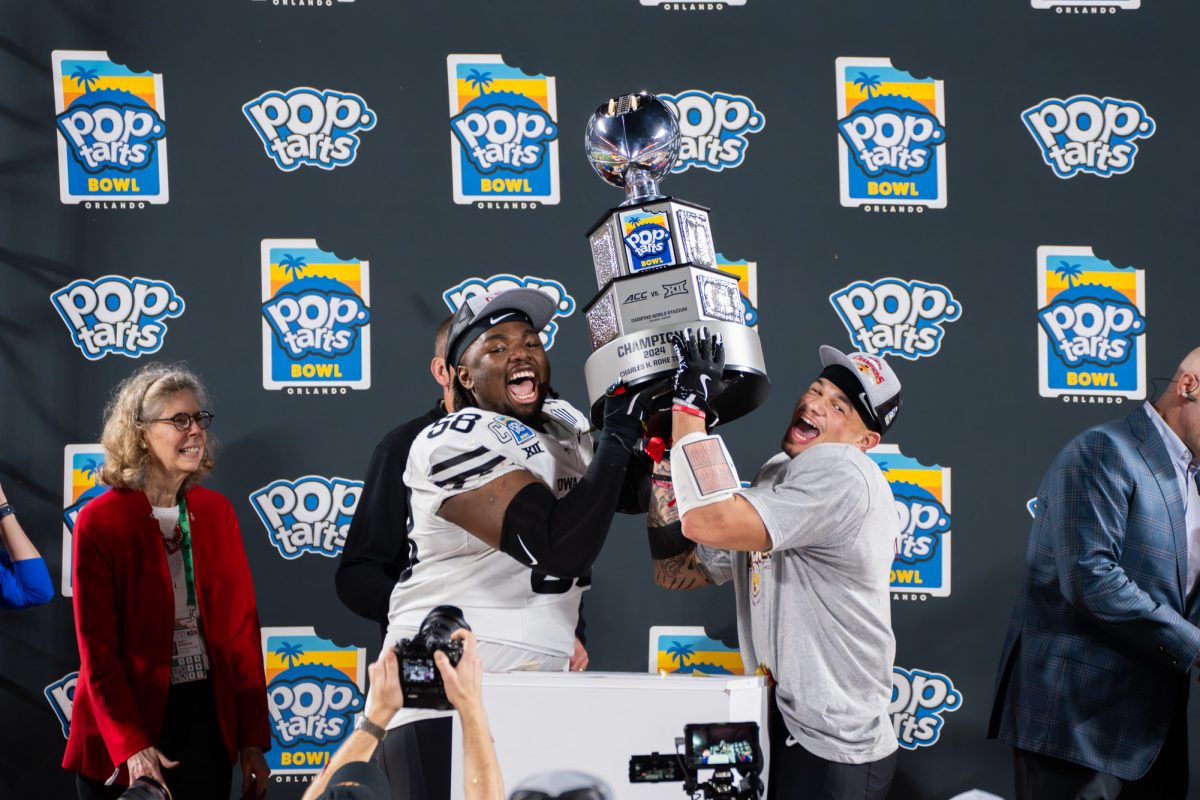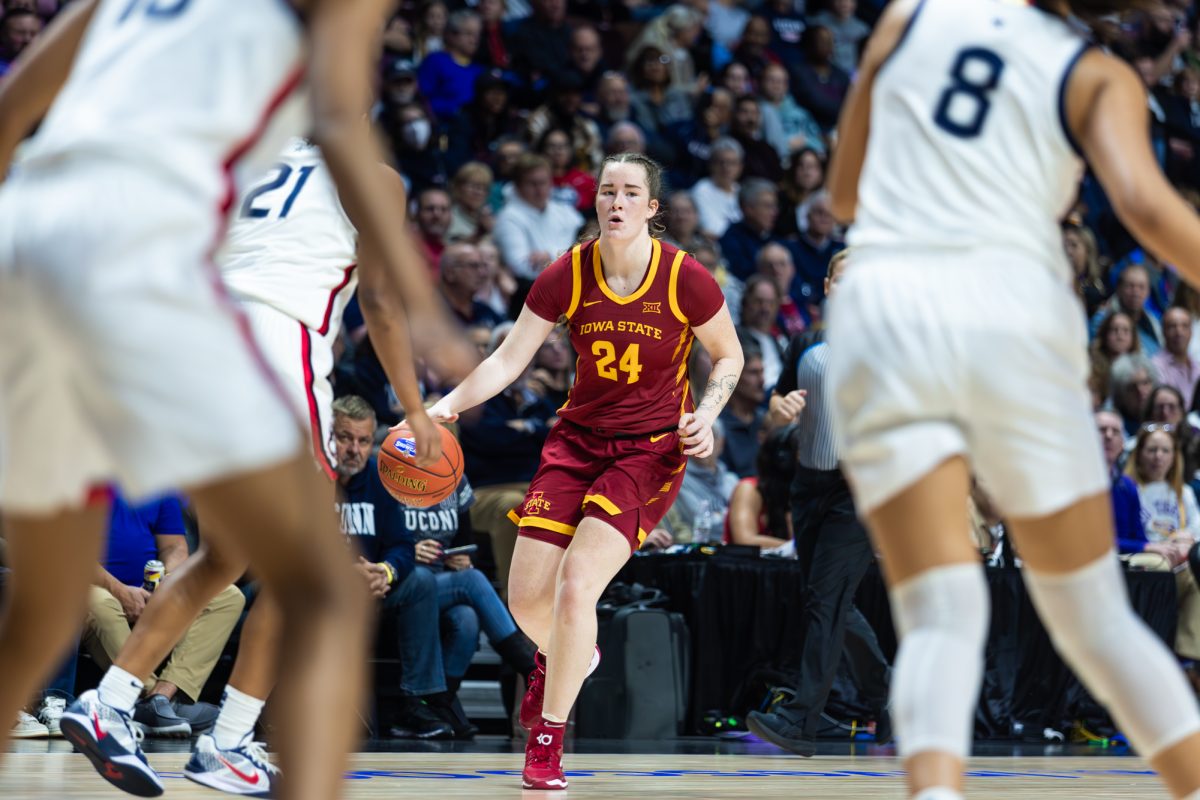Listen up!
October 3, 2001
When you think of cities that frequently host big-time orchestra and jazz acts, New York, Chicago or Los Angeles may come to mind. But this weekend, both a world-renowned orchestra and perhaps one of the most famous people in modern jazz will treat Ames to back-to-back concerts at Stephens Auditorium.
Tonight at Stephens the distinguished Philadelphia Orchestra will grace Ames with its presence and 24 hours later the Lincoln Center Jazz Orchestra and jazz great Wynton Marsalis will take the stage.
Book them, they will come
So what is it that draws these national orchestral and jazz acts to Iowa? After all, they sell out theaters across the country and play packed crowds in the biggest cities in the nation.
“Bringing in big name orchestras has been a tradition since Stephens has opened,” says Sara Huber, director of marketing at the Iowa State Center. “The sound in Stephens Auditorium is just phenomenal.”
According to Huber it’s no stretch of luck the biggest names in jazz and orchestra are heading to Ames. The Iowa State Center has the support of the Ames International Orchestra Festival Association.
Huber says with the help of the association and the acoustics of Stephens Auditorium, it’s not hard for Ames to draw in these types of acts.
In fact, both Marsalis and the Philadelphia Orchestra are making return trips, so they certainly are not strangers to the atmosphere of Stephens.
These two shows are part of the annual “Season at Stephens” which offers at least two orchestra selections and two jazz selections for the year. And this year, the Iowa State Center is offering three jazz events and two orchestra events including Cyrus Chestnut who will be playing Dec. 1 and Regina Carter who will be playing March 14. Montreal’s orchestra will also be playing in Ames during the school year.
Sunday Stephens Auditorium will have a joint-performance involving worldwide opera star Simon Estes and the Iowa State Wind Ensemble and Symphony Orchestra which, according to Mike Golemo, director of bands and assistant professor of music, is “an opportunity to hear one of the best voices in the world.”
Prime playing field?
So, how do other schools in Iowa compare to Iowa State in getting class acts to their campuses? Does Iowa State have an advantage because of the orchestra association and Stephens?
Huber claims that no other schools in Iowa can match the kind of classical music and jazz that Iowa State offers to its students.
“[The other schools in Iowa] don’t offer as big name orchestras as we do,” Huber says. “Although, some of the acts will go to the other schools in Iowa.”
Golemo says that Stephens “is well known among professional institutions plus there’s always a great, appreciative and knowledgeable audience.”
However, Kyle Munson, music critic for the Des Moines Register, disagrees:
“It would seem to me the schedule [in Ames] would pale in comparison,” Munson says, “just from the schedule that I’ve seen. But Ames is doing a fairly good job and it seems like they’re doing what they’re can.”
Is it any kind of surprise that Iowa draws these national orchestras to the Midwest? The average East Coast student certainly thinks that places like Iowa don’t get to see the same kind of entertainment that they do. However, Munson says the average East Coast school might not realize the number and quality of acts that come through Ames.
“I’ve talked to people that are surprised at some of the acts that we have [here in Iowa],” Munson says. “We’re not as backwards as everybody thinks we are.”
Huber says, “New York probably has more selection than we do, but Ames has a fairly good interest in orchestra and jazz to keep the big acts coming through.”
And according to Munson, the population base plays the biggest role in what comes to Ames and what doesn’t. After all, there is no way to compete with the populations of New York, Los Angeles and Chicago.
“We simply don’t have the population base to have the same kind of music,” Munson says. “I would also say it’s a matter of money and time for those acts.”
However, Golemo says that Iowa State draws better than one might think.
“A school like Northwestern has Chicago next door and they don’t have to bring things in,” Golemo says. “But we get better things than Des Moines.”
Opportunities abound
Another aspect of these big-time orchestras coming to town is that music majors get to benefit from their arrival.
“Anytime they offer a workshop and [students] can meet with them one on one it’s a great opportunity,” Golemo says. “Sometimes we’ve been able to work it out where somebody has a contact in the orchestra.”
Music majors will often anticipate the arrival of big-time orchestras or jazz bands, according to Golemo, because “they can sit down and get an expert opinion on what they are doing.”
In fact, many of the students have already set up appointments with members of the Philadelphia Orchestra.
Music majors aren’t the only ones who can benefit from these acts coming to Ames. Huber said ISU students have the opportunity to see these acts at highly-discounted prices. However, she says that most of them do not take advantage of these benefits.
“Because of the GSB we are able to offer ISU students half price for all our events,” Huber says. “It’s an opportunity [students] will never get again.”
While jazz may be a highly respected type of music among college students, it doesn’t usually draw well with the student population, even though jazz is fused into many types of music including rap and electronica.
“What’s popular is constantly in flux, jazz was at one time the popular music,” Munson says.
It wasn’t long ago that jazz was the popular music and what students were going to see. That trend has obviously died down in the past 60 years, and whether it was the rise of Elvis back in the middle of the century or the basic evolution of music, jazz is now seen as an ancient art. However, Munson says that jazz has certainly seen its time, even though that might be hard to imagine.
“It’s always hard to get the next generation really interested in previous generation’s music,” Munson says. “They all want their own.”
Indeed, Munson says, it’s easy to say that the appreciation and history are there for jazz and classical music, “but college students today still want their pop music.”
“I’d say we probably get at least 20 percent of our audience from Iowa State students,” Huber says. “Of course we’d like to see that percentage go up.”
Huber says that students should attend these music events while they are easily available.
“Do it now, before you get out and get involved in your career,” Munson says. “Take advantage of the ticket prices, being on campus, and having all this stuff come directly to you.”
Golemo says that students are missing out, and that “your college career should consist of learning more out of the classroom.”
“People are slow to accept what they don’t understand,” he says, “and quick to learn what they already know.”






